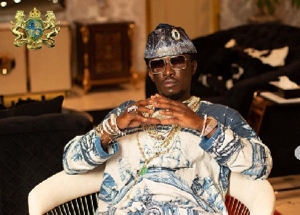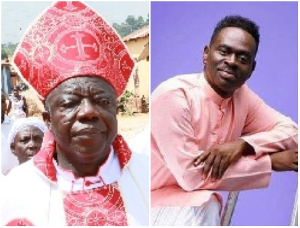Black star, isn’t that weird? At least everybody looks up to the sky at night and see amazing twinkling, crystalizing, and colorful stars. And what is it about this black star?
The Ghana flag has a black star inside it. It’s well positioned and keeps flying in its splendor in all of Ghana’s grand ceremonies and occasions. What does the black star mean to Ghanaians and beyond?
The Ghana flag was designed by Mrs.Theodosia Salome Okoh and was first introduced in 6th March 1957 during Ghana’s independence celebration in replacement of colonial British flag. It was designed to consist of Pan-African colors of red, gold and green all arrayed in three horizontal stripes. For some reasons, the colors were changed in 1964 but the old colors (which are the present colors) were re-adopted in 1966. In contrast to the 50 spangle stars of the United States of America’s flag, the Ghana flag has a five-pointed lone star placed in the center of the gold stripe which gives the flag a unique design and friendly focal view.
The black star has received some polemical criticism from many Ghanaians as well as across the world. Some persons find it unusual to have a star with the color black. Others think a black star can’t lead in times of darkness. We have other conservatives who think that the black star is a curse to the people of Ghana because a black star will only lead into darkness. These superficial conceptions about the Ghana black star are not merely sheer consequences of ignorance, rather, sheer consequences of illusionary thinking. What if the significance of the black star is far more than these superficial illusions? Can Ghanaians have a passionate relational significance to the black star symbol?
The adoption of the black star perhaps was seen as a deviance to the West. For about 486 years, the Gold Coast has been a new breaking ground for Westerners. First from the Portuguese in 1471 and others until the period of British colonization from 1902 till the collapse of colonialism in 1957. Within these periods, the West has taken absolute control over the land. The local Chiefs have lost their political and socio-economic control to the British. By and by the philosophy of westernization was conquering the traditions of the indigenous people of Ghana and by so they were losing total control to white supremacy. This smooth phenomenal transformation curved the black man’s identity as weak to govern self.
By consequence, we can say that the problem of colonization in Ghana was thus not a question of bad governance. The colonial British government was very efficient and peaceful. The problem was rather a question of white supremacy over the black man. It was a form of enslavement as long as the people never ruled themselves. The value of black identity, respect and dignity was suppressed under Western imperialism. Colonialism, therefore, became a “crime” against the freedom of Ghanaians to rule self, and the return of Nkrumah to the Gold Coast in 1947 triggered a speedy campaign for self-governance “now” — a movement which has been started already by the United Gold Coast Convention in 1946. Nkrumah’s radical campaign, united with the people of Ghana, led the Gold Coast from colonialism to independence or self-governance in 1957.
The newly born African Nation was ready to lead and fight its own battles. Nkrumah declared on the Independence Day to the rest of the world that “We have awakened. We will not sleep anymore. Today, from now on, there is a new African in the world! That new African is ready to fight his own battles and show that after all, the black man is capable of managing his own affairs. We are going to demonstrate to the world, to the other nations, that we are prepared to lay our own foundation.” As I have said somewhere, the independence philosophy was not just to lead a people from colonial rule. It was rather to take charge – as free people – the trust, confidence and the capacity to build a developmental attitude or culture to build a strong nation. There is no other central theme so vibrating in Nkrumah’s Independence Day speech than the idea that Ghana’s independence must lead to a virtuous exercise of liberty of a new Africa that affects all black generation. Nkrumah made it clear that “Our independence is meaningless unless it is linked up with the total liberation of Africa.”
The Afrocentric emphasis of Ghana’s independence to lead is what encapsulates the whole philosophy behind the black star. It’s quite important, and for the sake of understanding the adoption of the black star, that the end of colonialism in Ghana was not a gift Ghana asked for. It was won out of a battle and such a triumphant achievement for the sub-Saharan African nation was already a victory for the black people. It was a good start into a bright future. Obviously, the black star was well chosen as a revolutionary symbol of black power and emancipation. Unlike the other colors in the Ghana flag, the black star represents the triumphant fight against colonialism and imperialism in Africa. It’s a symbol charged with the spirit of an overcomer, freedom, justice and future hope for all black generation.
However, the meaning of the black star is more concrete, philosophical and metaphorically sensible. It’s not a “dark star”, it’s rather a shining black star and that’s the wonder the black man infuses into world’s history. Aren’t many black people shining in our world today? Is there any discipline in the world today where the black man is not there? Is there any else a White House that cannot contain the black man?
Today, the black star is the only symbol from Ghana’s independence that reminds the people of Ghana as champions of Africa’s freedom and pride. Beyond that it’s a monument of a kind that incites hope, leadership and accountability in all black generations. It designates all black people as free and out of this freedom they manage their own affairs. The next time you see the black star, remember you have a duty to fulfill. Shine! Shine! Shine! Let all blacks shine to dispel the darkness of retrogression.
- See more at: http://www.ghanatransformers.com/2014/05/29/meant-black-star/#sthash.uaW9KJlO.dpuf
Clifford Owusu-Gyamfi, University of Lausanne, Switzerland
Opinions of Wednesday, 4 June 2014
Columnist: Owusu-Gyamfi, Clifford














